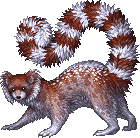Viewing mQQ1T

Father: Unknown
Unknown Pedigree
Hardiness: 35
Appearance: 5
Emerged: 16:50 18.01.2024
Matured: 11:38 20.01.2024
Despite their widespread population distribution, it may be difficult to spot Alta Koltukos during a wintry trek in the woods due to their penchant for hiding away in the tallest boughs of any given tree. These nimble climbers can be found throughout cold evergreen Kreskanta Tigo forests, although they sometimes also reside in more temperate climates—usually in areas with many Stranga Sciuros, whose wintertime nut stashes the Alta Koltukos will often raid. In addition to their diet of fruits and nuts, these opportunistic omnivores eagerly hunt smaller and less intelligent tree-dwelling mammals. For hours on end, an Alta Koltuko will observe its prey from a distance, noting the locations of its buried food stashes as well as the covered treetop niches where it goes to rest, before striking with a lethal pounce. After gorging itself on its unlucky victim, the Alta Koltuko will rebury the deceased creature’s stash in a more secure location and move into its former home. Violent turf wars can break out between two or more Alta Koltukos who are vying for the same precious nut hoard or sheltered niche, especially in sparser forests or colder climates where respite from the winter elements is difficult to come by.
The creatures that dwell in this rather desolate world still display some diversity in appearance, eating habits, and social behavior. Whether they have fur or feathers, skin or scales, their unique genetic makeup allows for a variety of colors and markings within each species. Despite limitations in food sources, herbivores, omnivores, and carnivores are all present in the food chain, and each species requires specialized care within a laboratory. Although the artificial setting of housing units and breeding pods precludes most opportunities to study true interspecific behavior, the interactions within and between species has been studied extensively in the wilderness by scientists daring enough to venture beyond the outpost’s walls.
